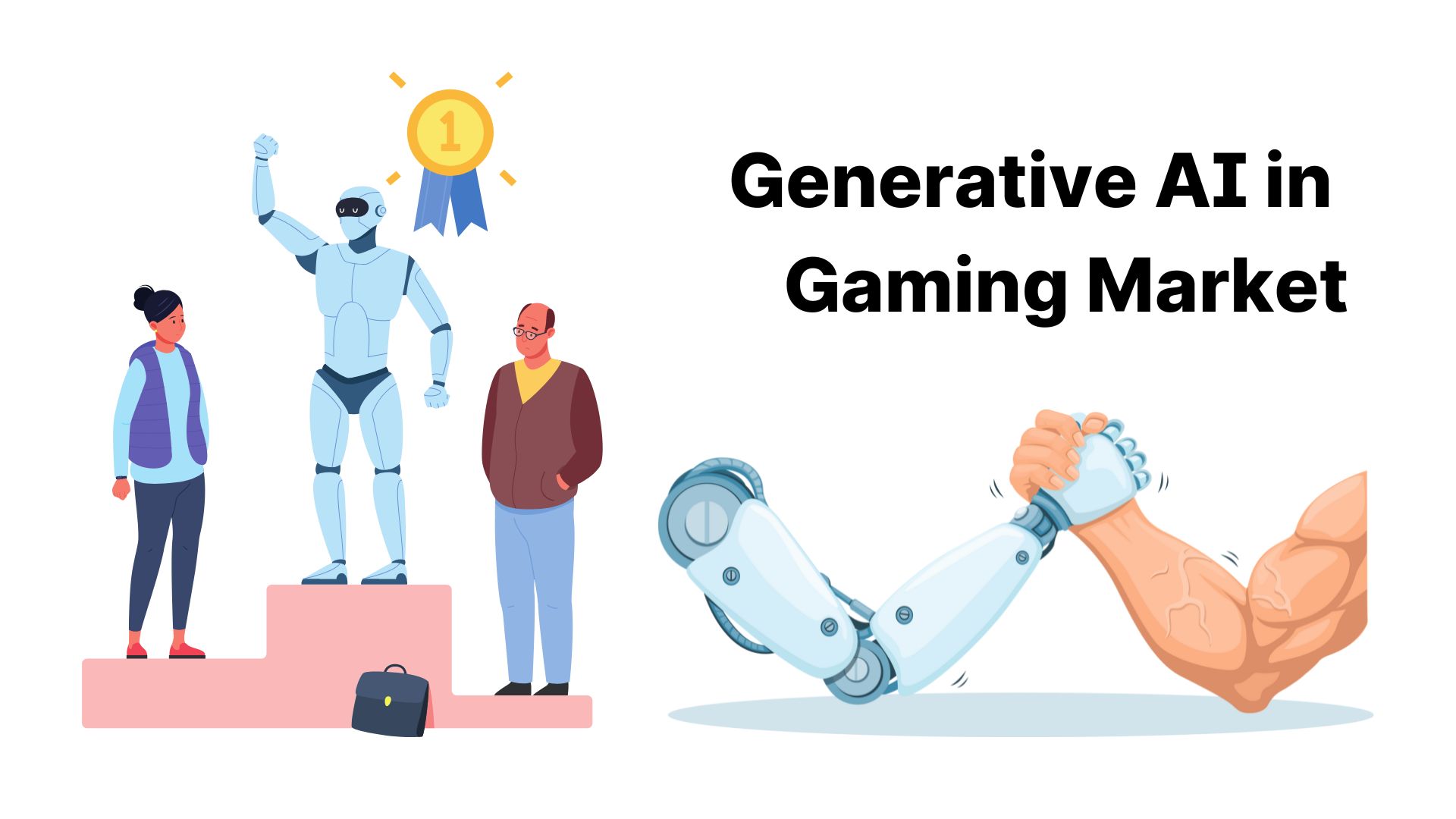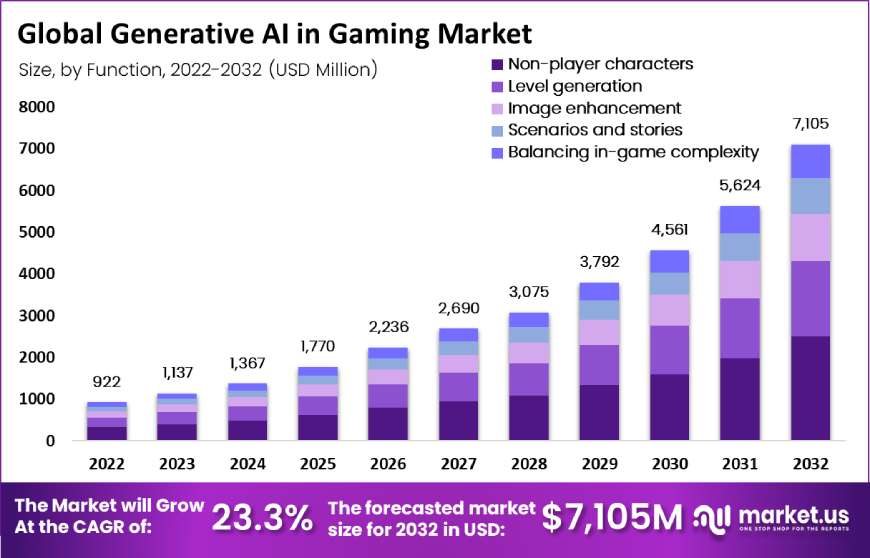Generative AI in Gaming Market to Reach USD 7,487.9 Mn, Globally, by 2032

Page Contents
Market Overview
Published Via 11Press: In 2022, the Global Generative AI Gaming Market was valued at USD 922 Mn. Over 2023-2032 it is predicted to experience a compound annual compounded annual compound growth of 23.3% with an expected valuation of USD 7,4887.9 Mn by 2032.
Generative AI gaming is an emerging field that blends artificial intelligence with gaming to offer personalized and authentic experiences for players. Generative AI technology uses machine learning algorithms to generate content such as characters, environments and music that adapts to suit a player's behavior and preferences.
Generative AI in gaming has already made an impression statement about its potential use within the industry. Games such as No Man's Sky and Minecraft make use of generative AI algorithms to generate procedurally generated worlds that are unique for each player, while AI Dungeon, an old school text-based adventure game uses Generative AI algorithms to craft personalized narratives for each user.
As technology becomes more advanced and game developers seek out ways to offer personalized experiences for players, the market for generative AI in gaming should continue its upward trajectory. However, ethical considerations surrounding its use must also be addressed as more sophisticated AI algorithms must be created in order to provide truly engaging experiences for gamers.
For further details on major revenue-producing segments, request a pricing optimization software market Request for PDF sample report

Key Takeaways
- The market for generative AI gaming technology is projected to experience rapid expansion over the coming years due to growing consumer demand for personalized gaming experiences and breakthroughs in AI technologies.
- North America is anticipated to lead the gaming market, followed by Europe and Asia-Pacific due to the presence of major gaming companies in these regions.
- Due to mobile gaming's increasing popularity, mobile gaming is projected to become one of the largest and fastest-growing segments for generative AI in gaming market. Generative AI's potential can create more engaging and immersive gameplay experiences for players.
- Ethics remain at the core of artificial intelligence (AI), so game developers must keep this in mind when implementing AI algorithms – this includes any that generate generative AIs.
Regional Snapshot
- North America: North America is poised to lead the generative AI gaming market due to the presence of major gaming companies as well as increasing demand for personalized gaming experiences.
- Europe: Europe is expected to become the second-largest market for generative AI gaming due to the increasing popularity of mobile gaming and advances in AI technology.
- Asia-Pacific: Asia-Pacific's market for generative AI gaming should experience rapid expansion due to an increasing mobile gaming population and adoption of AI technology across gaming industry segments.
- Rest of the World: While emerging markets will likely represent a smaller share in terms of market size for generative AI gaming technologies, they should experience growth due to increasing consumer demand for personalized gaming experiences.
Drivers
- Increasing Demand for Personalized Gaming Experience: Generative AI technology allows game developers to design unique and tailored experiences for players, increasing engagement and satisfaction levels among gamers.
- Advancements in AI Technology: Modern advances in artificial intelligence technologies such as machine learning and natural language processing have allowed researchers to create more sophisticated generative AI algorithms capable of producing more immersive and realistic gaming experiences.
- Growing Popularity of Mobile Gaming: With mobile gaming becoming more and more prevalent, demand has skyrocketed for personalized experiences that can be played on mobile devices – an essential driver of growth in the generative AI gaming market.
- Generative AI Technology Provides Innovative Gaming Experiences: Generative AI has the potential to deliver unique gaming experiences previously unavailable, thus broadening the appeal of the gaming industry as a whole.
Restraints
- Ethical Concerns: AI use in gaming presents many ethical considerations, such as privacy and security risks and the potential for it to generate biased or discriminatory content.
- Implementation Complexity: Implementing generative AI technology in gaming requires special skills and resources, making implementation a difficult and expensive endeavor for game developers.
- Lack of Awareness: Game developers and consumers who lack an understanding of generative AI technology could stymie its expansion in the market.
- Regulatory Challenges: Artificial intelligence in gaming could present regulatory issues and compliance requirements that could impede its adoption by game developers.
Opportunities
- Presented by VR/AR: With increasing interest in virtual and augmented reality gaming experiences comes an opportunity for generative AI technology to create more realistic gaming environments that offer immersive virtual reality gaming experiences.
- Expanding Gaming Industry: As gaming expands, AI technology presents an exciting opportunity to provide more innovative and engaging gaming experiences.
- Rising of Esports: ESports have provided an ideal platform for applying generative AI technology to create more personalized and immersive gaming experiences for players.
- Collaboration and Partnerships: Collaboration between game developers and AI technology providers can produce more advanced generative AI algorithms that deliver improved gaming experiences for players.
Challenges
- Ethical and Legal Concerns: Ethical and legal considerations surrounding AI technology's application in gaming – such as privacy, security and bias issues – pose an insurmountable obstacle to its widespread implementation within this sector.
- Complexity of Implementation: Integrating Generative AI technology in gaming can be both costly and time consuming, necessitating special skills and resources for its successful deployment.
- Limited Understanding and Awareness: Game developers and consumers with little understanding or awareness of generative AI technology could face difficulty adopting this new tech.
- Limited Data Access: Due to data constraints, training generative AI algorithms may take more time and require additional information than anticipated, which could reduce accuracy and effectiveness of algorithms.
Recent Developments
- In February 2021, OpenAI launched DALL-E, an AI model capable of generating unique images from textual descriptions, which has the potential to be used in the gaming industry to create more realistic and personalized gaming environments.
- In March 2021, Nvidia announced the launch of its AI-based DLSS technology, which uses deep learning algorithms to enhance the graphics and performance of video games.
- In April 2021, Microsoft announced the acquisition of Nuance Communications, a company specializing in conversational AI, which could be used to enhance the voice recognition and natural language processing capabilities of games.
- In May 2021, Ubisoft announced a partnership with Nvidia to integrate AI technologies, including generative AI, into its game development process.
Key Market Segments
By Technique
- Deterministic
- Nondeterministic
By Function
- Image Enhancement
- Level Generation
- Scenarios & Stories
- Balancing In-Game Complexity
- Non-Player Characters
By End-Users
- Game Studios
- Developers
- Designers
- Artists
- Other End-Users
Market Key Players
- ChatGPT
- Electronic Arts (EA)
- NVIDIA Corporation
- Apex Game Tools
- Procedural Arts
- AI Dungeon
- IBM
- ai
- Pyka
- Baidu
- ai
- io
- Other Key Players
Report Scope
| Report Attribute | Details |
| The market size value in 2022 | USD 922 Mn |
| Revenue forecast by 2032 | USD 7,487.9 Mn |
| Growth Rate | CAGR Of 23.3% |
| Regions Covered | North America, Europe, Asia Pacific, Latin America, and Middle East & Africa, and Rest of the World |
| Historical Years | 2017-2022 |
| Base Year | 2022 |
| Estimated Year | 2023 |
| Short-Term Projection Year | 2028 |
| Long-Term Projected Year | 2032 |
FAQs
Q: What is generative AI in gaming?
A: Generative AI in gaming refers to the use of artificial intelligence algorithms to generate content, such as characters, environments, and storylines, in video games.
Q: How does generative AI technology improve gaming experiences?
A: Generative AI technology can improve gaming experiences by creating unique and personalized content, such as characters and environments, that can enhance player engagement and satisfaction.
Q: What are the ethical concerns associated with the use of AI in gaming?
A: Ethical concerns associated with the use of AI in gaming include privacy and security issues, the potential for the AI to create biased or discriminatory content, and the potential for addiction and other negative impacts on players.
Q: What are the benefits of using generative AI in mobile gaming?
A: The benefits of using generative AI in mobile gaming include the ability to create more personalized gaming experiences, enhance player engagement and satisfaction, and improve the overall quality of mobile games.
Q: What are the challenges associated with implementing generative AI in gaming?
A: The challenges associated with implementing generative AI in gaming include the complexity and cost of implementation, limited availability of data, and the ethical and legal concerns associated with the use of AI in gaming.
Content has been published via 11press. for more details please contact at [email protected]
The team behind market.us, marketresearch.biz, market.biz and more. Our purpose is to keep our customers ahead of the game with regard to the markets. They may fluctuate up or down, but we will help you to stay ahead of the curve in these market fluctuations. Our consistent growth and ability to deliver in-depth analyses and market insight has engaged genuine market players. They have faith in us to offer the data and information they require to make balanced and decisive marketing decisions.